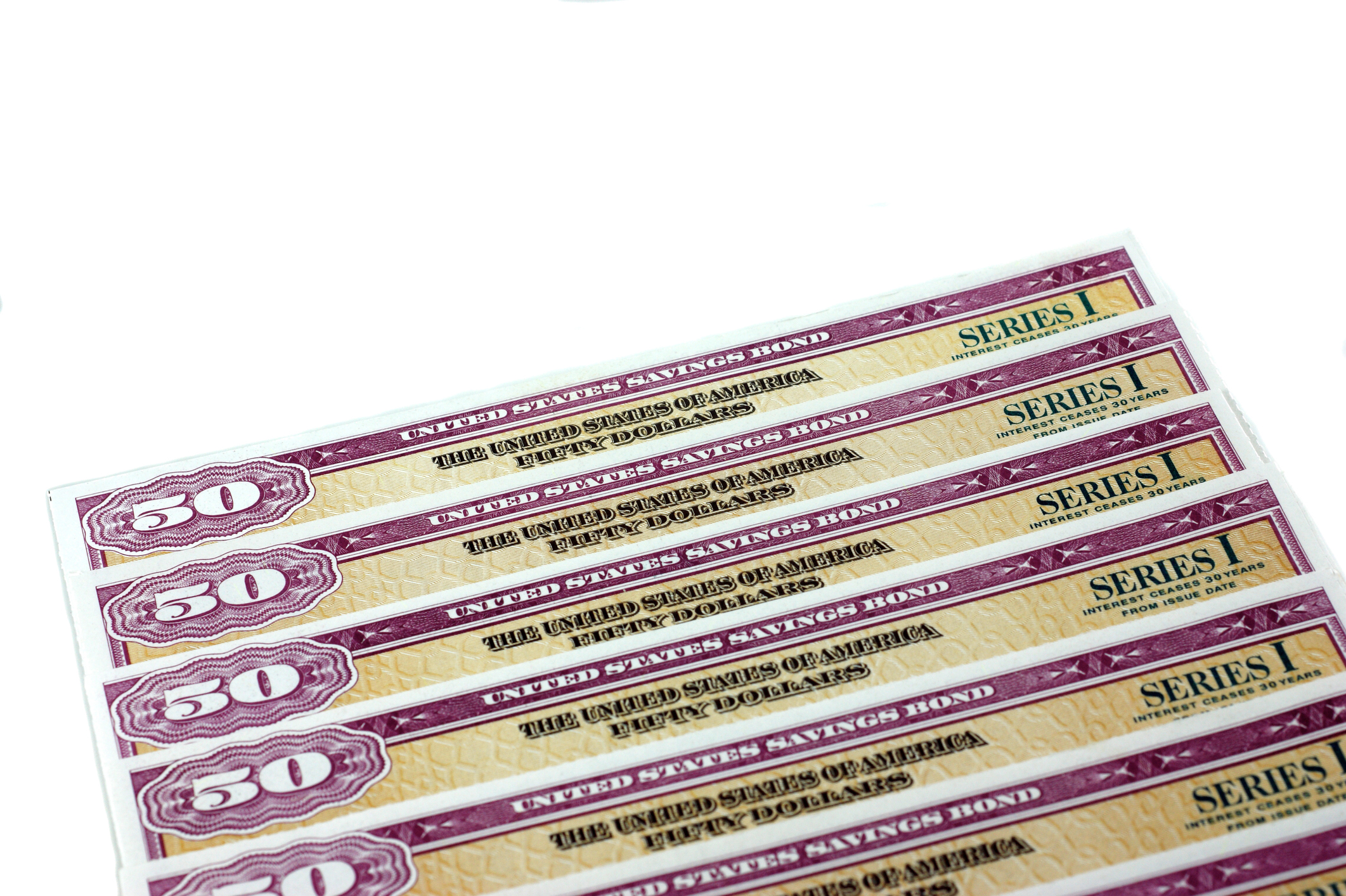Is It A Good Time To Cash In Your I Bonds?
As inflation eases, investors are redeeming their I bonds and putting the money elsewhere.

Donna LeValley

Profit and prosper with the best of Kiplinger's advice on investing, taxes, retirement, personal finance and much more. Delivered daily. Enter your email in the box and click Sign Me Up.
You are now subscribed
Your newsletter sign-up was successful
Want to add more newsletters?

Delivered daily
Kiplinger Today
Profit and prosper with the best of Kiplinger's advice on investing, taxes, retirement, personal finance and much more delivered daily. Smart money moves start here.

Sent five days a week
Kiplinger A Step Ahead
Get practical help to make better financial decisions in your everyday life, from spending to savings on top deals.

Delivered daily
Kiplinger Closing Bell
Get today's biggest financial and investing headlines delivered to your inbox every day the U.S. stock market is open.

Sent twice a week
Kiplinger Adviser Intel
Financial pros across the country share best practices and fresh tactics to preserve and grow your wealth.

Delivered weekly
Kiplinger Tax Tips
Trim your federal and state tax bills with practical tax-planning and tax-cutting strategies.

Sent twice a week
Kiplinger Retirement Tips
Your twice-a-week guide to planning and enjoying a financially secure and richly rewarding retirement

Sent bimonthly.
Kiplinger Adviser Angle
Insights for advisers, wealth managers and other financial professionals.

Sent twice a week
Kiplinger Investing Weekly
Your twice-a-week roundup of promising stocks, funds, companies and industries you should consider, ones you should avoid, and why.

Sent weekly for six weeks
Kiplinger Invest for Retirement
Your step-by-step six-part series on how to invest for retirement, from devising a successful strategy to exactly which investments to choose.
In 2022, a spike in inflation made normally staid Series I savings bonds almost as popular as tickets to Taylor Swift’s Eras tour. I bonds issued between May and October 2022 earned a six-month composite rate of 9.62%, creating a surge in demand from yield-hungry investors that briefly overwhelmed the TreasuryDirect website.
I bond rates have since come down to earth; bonds issued between November 2023 and April 2024 pay a composite rate of 5.27%. Meanwhile, some certificates of deposit and high-yield savings accounts are paying more than 5%, and the recent yield on one-year Treasury bills topped 4.8%. Yields on Treasury inflation-protected securities (TIPS) — government securities that are indexed to the rate of inflation — are also attractive now, says David Enna, founder of Tipswatch.com, a website that focuses on I bonds and TIPS.
But I bonds may still provide some benefits for long-term investors, particularly those issued between November 2023 and April 2024. And cashing in your I bonds may mean giving up some interest — if you can cash them in at all.
From just $107.88 $24.99 for Kiplinger Personal Finance
Become a smarter, better informed investor. Subscribe from just $107.88 $24.99, plus get up to 4 Special Issues

Sign up for Kiplinger’s Free Newsletters
Profit and prosper with the best of expert advice on investing, taxes, retirement, personal finance and more - straight to your e-mail.
Profit and prosper with the best of expert advice - straight to your e-mail.
I bonds consist of two components: an inflation rate, which is based on the consumer price index and is adjusted every six months from the bond’s issue date, and a fixed rate that remains the same for the life of the bond (up to 30 years).
You can’t redeem an I bond in the first year, and if you cash it in before five years have passed, you’ll forfeit the most recent three months of interest. (If you check your bond’s value at TreasuryDirect.gov within the first five years of owning it, the amount you’ll see will have the three-month penalty subtracted from it.)
Weighing the options to cash in your I bonds
With that penalty in mind, if you’ve owned an I bond for longer than a year but less than five years, is it worth redeeming the bond — which means giving up some of the interest you’ve earned — so you can reinvest the money in a higher-yielding investment?
The answer depends on your goals, when you bought the I bond and the fixed rate for the bond, says Enna. For example, if you bought one in October 2022 — when many investors snapped up I bonds to capture the 9.62% rate for six months before the rate reset — your optimal redemption date was January 1, 2024, Enna says.
The reason: Those bonds earn a 0% fixed rate and transitioned in October 2023 to a composite rate of 3.38%, which is well below what you can get from short- term Treasuries. If you wait to cash in the bond until three months after the rate resets, the interest penalty will apply entirely to the 3.38% rate, rather than some portion of the penalty applying at the higher 6.48% rate that the bond earned during the previous six months.
“All I bonds purchased from May 2020 through Oct. 2022 have a fixed rate of 0.0%, so those are targets for redemption” says Enna. For I bonds purchased in September 2022, the optimal redemption date was December 1, 2023; for bonds purchased in August 2022, the optimal redemption date was November 1, 2023. Enna continued “I think all of those 0.0% I bonds are now paying either 3.38% or 3.94% — and have been for three months — so they could be targets for redemption.”
For I bonds purchased in November 2022 through April 2023 — which couldn’t be redeemed until at least November 2023 — your optimal redemption date depended on the inflation-adjusted rate announced on November 1. The bonds’ inflation rate is now 3.24%.
Enna advises to “target I bonds with a 0.0% fixed rate. If the fixed rate is higher, do not redeem. The fixed rate rose to 0.4% in November 2022 so any I bond purchased after that date should be held.
Likewise, you may want to hold on to I bonds issued between May and October 2023. Those I bonds have a fixed rate of 0.9%, which is the highest fixed rate in 16 years. No matter what happens to inflation in the future, you’ll lock in that rate for as long as you own the bonds.
“My rule of thumb is, if you have a very attractive fixed rate, hold on to it as long as possible,” Enna says.
Note: This item first appeared in Kiplinger's Personal Finance Magazine, a monthly, trustworthy source of advice and guidance. Subscribe to help you make more money and keep more of the money you make here.
Related Content
Profit and prosper with the best of Kiplinger's advice on investing, taxes, retirement, personal finance and much more. Delivered daily. Enter your email in the box and click Sign Me Up.

Block joined Kiplinger in June 2012 from USA Today, where she was a reporter and personal finance columnist for more than 15 years. Prior to that, she worked for the Akron Beacon-Journal and Dow Jones Newswires. In 1993, she was a Knight-Bagehot fellow in economics and business journalism at the Columbia University Graduate School of Journalism. She has a BA in communications from Bethany College in Bethany, W.Va.
- Donna LeValleyRetirement Writer
-
 Dow Loses 821 Points to Open Nvidia Week: Stock Market Today
Dow Loses 821 Points to Open Nvidia Week: Stock Market TodayU.S. stock market indexes reflect global uncertainty about artificial intelligence and Trump administration trade policy.
-
 Nvidia Earnings: Live Updates and Commentary February 2026
Nvidia Earnings: Live Updates and Commentary February 2026Nvidia's earnings event is just days away and Wall Street's attention is zeroed in on the AI bellwether's fourth-quarter results.
-
 I Thought My Retirement Was Set — Until I Answered These 3 Questions
I Thought My Retirement Was Set — Until I Answered These 3 QuestionsI'm a retirement writer. Three deceptively simple questions helped me focus my retirement and life priorities.
-
 Why the Next Fed Chair Decision May Be the Most Consequential in Decades
Why the Next Fed Chair Decision May Be the Most Consequential in DecadesKevin Warsh, Trump's Federal Reserve chair nominee, faces a delicate balancing act, both political and economic.
-
 It's Time to Rethink What 'Aging Well' Means
It's Time to Rethink What 'Aging Well' MeansDon’t fall into the trap of thinking there is a "right way" to age. Here's how to reframe aging in a healthy, achievable way.
-
 Yes, Artificial Intelligence Stocks Are Booming
Yes, Artificial Intelligence Stocks Are BoomingIt's fair to ask about the latest tech boom, "Is it really different this time?"
-
 A Value Focus Clips Returns for This Mairs & Power Growth Fund
A Value Focus Clips Returns for This Mairs & Power Growth FundRough years for UnitedHealth and Fiserv have weighed on returns for one of our favorite mutual funds.
-
 Small-Cap Stocks Gain Momentum. That's Good News for This iShares ETF
Small-Cap Stocks Gain Momentum. That's Good News for This iShares ETFThe clouds appear to be parting for small-cap stocks, which bodes well for one of our favorite exchange-traded funds.
-
 11 Stock Picks Beyond the Magnificent 7
11 Stock Picks Beyond the Magnificent 7With my Mag-7-Plus strategy, you can own the mega caps individually or in ETFs and add in some smaller tech stocks to benefit from AI and other innovations.
-
 I’ve Played 1,300-plus Golf Courses: These Are the 4 on My 'Must-Play' List for 2026
I’ve Played 1,300-plus Golf Courses: These Are the 4 on My 'Must-Play' List for 2026These four luxury golf courses offer an extraordinary experience for players this year.
-
 Should You Be Investing in Emerging Markets?
Should You Be Investing in Emerging Markets?Economic growth, earnings acceleration and bargain prices favor emerging markets stocks right now.